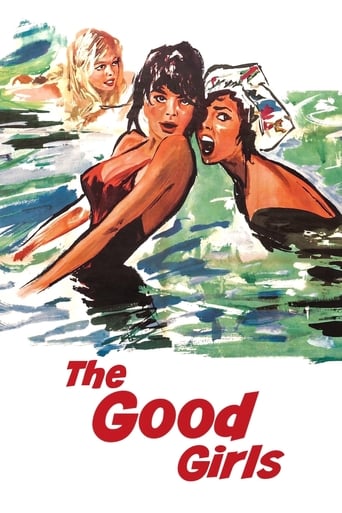

I own this DVD and have seen it many times. Fitting for its genre, it is intense, dark, sensual, and poetic. It's like riding in a car that you know is going dangerously fast but you're enjoying it too much to ask the driver to slow down. Although the storyline is quite simple, indeed not much happens to the girls before the ending climax, their fervor and hunger for life is palpable. It is the mood more than the events in the film that make its strong impact. Jane is mesmerizing, charming and complex, at different times a little girl, a rebellious teenager, or a flirtatious temptress. On the opposite side, Jaqueline is an utter mystery, implying a nature both extremely intelligent and extremely troubled. The men in the film are basically facades, people there to react to the girls, or to lead them into situations where they must react, or ***spoiler coming*** claim them as their victim. But even in the case of the murder, it is less about the killer and more about Jaqueline allowing herself to be taken by him emotionally, and what came to her as a result. Les Bonnes Femmes is a story open to much interpretation, rich with clues and artistic integrity.
... View MoreWe first encounter the women in the story late one night as they step out from a night club. Jane and Jacqueline are going home on foot. Two men jump into a white Cadillac and keep following them as one of them, Marcel, wants the two women to go to another night spot. We also see a somewhat mysterious man who gets on his motorcycle and tails the car and the women. This shadowy figure will remain a mystery until the last minutes of the film, yet, he will be connected with the women in ways that are not immediately known to the viewer.Jane, is a bold woman who seems not to be a stranger to sexual pleasures. Jacqueline, on the other hand has a romantic nature. After spending some time with Albert and Marcel in the cabaret, Jacqueline is bored and goes home. Jane, who goes with the men to their apartment, returns home in time to change to go to work. Ginette and Rita are the other friends, and co-workers, in a small appliance store. Louise, the cashier, is more or less in charge of the girls and she identifies herself with Jacqueline, who in spite of having come in late for her first day at the shop, seems to be a kindred soul.Ginette, who shares a flat with Jane, is a woman living a double life. She works in the shop, but is a singer who works in a theater that has variety acts. She doesn't want to let the other girls know what she does. Rita, the fourth friend, is engaged to a fatuous man who appears to be embarrassed to be introducing her to his parents.These four women appear to be living boring lives. Their only escape is the night life all around them. Jacqueline, who is approached by a delivery man at the shop for a date, refuses him. At the same time, that night, at a swimming pool she is saved from Marcel and Albert's horseplay with her in the water by the motorcyclist. This meeting leads to an unexpected turn of events for Jacqueline, who doesn't have a clue as to what is going to happen to her. A hint to Jacqueline's fate is comes later in the film, as she asks Louise about a "fetish" she carries with her.This film was not seen widely in this country after it was released. In fact, it remains an enigma why it was not discovered by film fans, the way it deserved. Claude Chabrol, the director, who also contributed to the screen play, gives the story a great staging. It's one of his works that most closely resembled a product of the New Wave movement as it took the cameras into the streets to show a slice of the lives of these four women that are so closely connected.There is a lot to admire in the way Mr. Chabrol designed this film. He got great support by the amazing cinematography of Henri Decae, one of the best in the French cinema. Even after more than forty years after this film made its debut, it has much to be admired in what Chabrol was able to accomplish with it. The character studies of these women living ordinary lives reveals the director knew them well.Clothilde Joano makes an impression as Jacqueline. Bernadette Lafont does wonders with her Jane. Stephane Audran, who went to star in a lot of films of her then husband, is quite effective as Ginette. Lucile Saint-Simon, is Rita, who had a short role. Ave Nimchi, has some good moments as Louise, the cashier. Jean-Louis Maury and Albert Dinan are seen as Marcel and Albert. Mario David plays Albert Lapierre, the motorcyclist.This film is a "must see" for all Claude Chabrol's fans
... View MoreA friend of mine - a film scholar - once said that this film shouldn't work but it does. He was absolutely right. I cannot think of one good reason why this film should be as good as it is. The tone is observational, like many films of the "New Wave," but it lacks the frenetic energy of Godard, or the jaded lyricism of Truffaut. The tone of the film changes drastically at several points, and in any other film this would become a big turn off. But a strand of sincere honesty about the characters and their emotions holds the film together, stronger than any formality.Let the film take you where it wants you to go, and the experience is wonderful.
... View MoreMasterful early Chabrol film with brilliant acting and tense situtations. A preview of situtations and things to come in later Chabrol thrillers. The man on the bike is an enimatic figure whose intentions are not revealed until the final moment. The final scene is done in the manner of a dream. I think that Les Bonnes Femmes(1960) had a slight influence on Ms. 45(1981) especially on the working relationship of woman. Seeing it makes me interested in watching more films by Claude Chabrol. Classic French cinema of the New Wave besides Shoot the Piano Player(1961) and Breathless(1959).
... View More